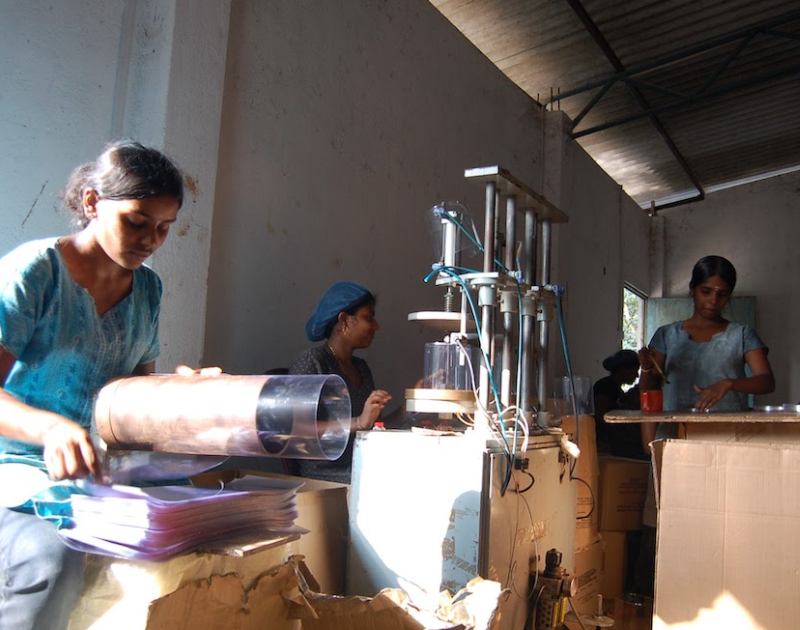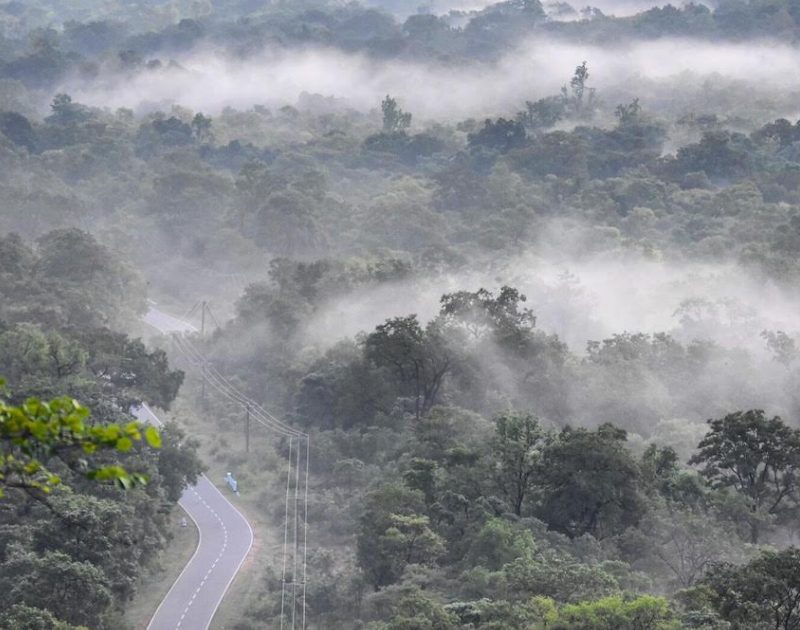
- Home
- Knowledge Insights
- Prioritising Green Jobs in Sri Lanka’s Economic Recovery
We hear regularly that a defining feature of the future job market is the impact of technological advancements, like robotics and artificial intelligence. Yet, the impact of green growth imperatives are likely to be an equally profound feature of the future job market, and often attracts less focus in many developing countries – including Sri Lanka.
Alongside the launch of the 2023 Future of Jobs report by the World Economic Forum, it was noted by a Managing Director of WEF that, “relative to today, the highest amount of growth is expected to be in sectors that require green jobs and green skills”. The report also noted that year-on-year growth in hiring of green jobs exceeds the overall hiring rate growth every year since 2019. Consequently, the job market is responding. According to data from the professional networking platform, LinkedIn, ‘sustainability jobs’ make up three (3) of the top ten (10) fastest growing roles on the platform over the last four years – this includes ‘Sustainability Analysts’, ‘Sustainability Specialists’, and ‘Sustainability Managers’.
What are Green Jobs and Green Skills?
According to the ILO (2022) green jobs are defined as “decent jobs that contribute to preserving or restoring the environment, be they in traditional sectors such as manufacturing and construction, or in new, emerging green sectors such as renewable energy and energy efficiency”. Even this definition is quite limiting – the ‘emerging green sectors’ are not just in energy, but also in pollution abatement, conservation, ecological restoration, green reporting, and many more. Meanwhile, ‘green skills’ can be explained as those skills that enable the environmental sustainability of economic activities, which could be in new green growth sectors, or those required in new roles or new competencies in existing sectors. The latter point is important because the increase in green jobs in the labour market is not just limited to typically identifiable “green” careers like ecology, renewable energy, natural resource management, environmental science, and so on – it is fast growing in more mainstream careers like industrial processes, corporate services, and data analysis.
Perhaps a more organized way to understand the spectrum and typology of jobs in the green economy is through the following categories: Core green jobs, Green-enabled jobs, and Green-enabling jobs. Let’s explore each of these briefly:
Rise of Green Jobs Globally and in Sri Lanka
On the LinkedIn platform, some of the fast growing green jobs include Wind Turbine Technician (24%), Solar Consultant (23%), Ecologist (22%), and Environmental Health and Safety Specialist (20%). These would come under the category of ‘Potential green jobs’ and ‘Core green jobs’. Other such jobs would be Geotechnician (to analyse soil samples), Flood Risk Engineer, Recycling Operative, and EV Installer. In Sri Lanka, too, we can observe the rise in solar energy companies, and automobile garages that specialise in hybrid and electric vehicles. These all lend themselves to a growth in technical and vocational jobs.
A CSF analysis of job listings on five online job portals (TopJobs, JobPal, XpressJobs, IkmanJobs, and DreamJobs) show a number of roles across all three of the earlier mentioned three categories. We analysed job listings in a randomly selected week and clustered them into sectors/groups[i]: Environmental management (like wastewater treatment); Environmental sustainability; Electric vehicles (EV); and Solar and other renewable energy. During just the week under review, there were nearly 75 job listings in these areas, across four out of five online job portals[ii].
Solar and other renewable energy had the highest number of job listings (40), followed by Environmental sustainability (19) and Environmental management (13). Example job roles in Solar and other renewable energy ranged from ‘core green jobs’ in this space like ‘Solar Engineer’, and ‘Solar PV Technical Officer/Assistant Maintenance Engineer; to ‘green-enabling jobs’ in this space like ‘Procurement Officer – Solar’ and ‘Sales Manager – Solar PV’. Example job roles in Environmental sustainability ranged from ‘Sustainability and Compliance Executive’ to ‘Environmental Health and Safety Officer’ and ‘Intern – Environmental Sustainability’. Jobs in the EV space included ‘core green jobs’ like ‘Electric Vehicle Technician’ and ‘Technical Consultant to Prepare Code of Practice and Technical Standards for EV Charging Stations’, as well as ‘green-enabling jobs’ like ‘Sales Executive – Electric Vehicles/LED/Solar’. The array of job roles across just these online platforms and just these 75 listings was revealing. Notably, though, we did not find any live listings across any of these platforms on disciplines and roles in ‘Conservation’, ‘Restoration’, ‘Ecology’ that we were also interested in looking for.
We complemented this online review with field interviews with firms in the green economy space. We identified a captive group of potential interviewees at a trade show in Colombo[iii]. The 15 companies interviewed were in the Environmental management (primarily in water treatment), EV, and Solar energy industries. A minimum estimate of 27 new jobs across these industries could be identified as being generated in the near-term, including by Indian companies that intend to set up operations in Sri Lanka. Across the board, companies were primarily looking for engineering graduates (mechanical, electrical and chemical). When asked about the need for environmental engineering know-how, many considered it to be the most preferred but observed that such graduates were hard to find in Sri Lanka. Two companies in the water treatment sector indicated they preferred hiring people with no work experience, as their in-house training programmes (on their specific equipment) would be easier and faster.
Importance for Sri Lanka’s Recovery
It is now well established that the pressures on Sri Lanka’s natural ecosystems and impacts from global climate change are acute and increasing. The confluence of climate risk (ranked 23rd of 180 countries in the Global Climate Risk Index, and 19 million Sri Lankans live in locations set to become moderate or severe climate hotspots by 2050); biodiversity loss (66 critically endangered and 102 endangered species and is one of 36 biodiversity hotspots with high species endemism; and coastal vulnerability (shoreline retreat is estimated to be 200,000 to 300,000 m2 per year, while 40% of the country lives and works within a coastal belt of 2km) among other pressures will crucially define the next two to three decades of Sri Lanka’s development. This then means both that new types of jobs will emerge as these challenges throw up new requirements in the labour market, but also that the job market needs to rise to provide new skills to help the Sri Lankan economy meet these challenges.
The sheer range of new opportunities that will arise is exciting. Designers of green and climate resilient building materials, naturalists and conservationists for tourism properties, ecologists for measuring natural capital in protected areas, and upcycling specialists in creative industries like fashion, are just some of the new opportunities that come to mind. In addition to these ‘core green jobs’ or ‘emerging green jobs’, there will be requirements for green competencies in traditional professions – like finance, manufacturing, and auditing. In banking and finance, the need for green finance experts in Sri Lanka is already emerging among banks and non-bank finance companies. In manufacturing, resource efficient circular production is gaining ground in Sri Lankan production facilities. In audit and compliance, the need for green compliance specialists as more corporates and exporters strive to meet net zero targets and are pushed by buyers (e.g. the EU) to keep adding new green credentials.
Green job opportunities will not just be in ‘green sectors’, but increasingly in ‘brown’ ones too, because all sectors of the economy that exist today, whether it be apparels, tea, rubber, light engineered goods, and tourism, will be under pressure to adopt green practices. Very little empirical work has been done on this topic in Sri Lanka, with just one from over a decade ago (Jayaweera et al., 2012) which surveyed 50 firms and noted that, “Sri Lankan organizations need comprehensive training packages in order to create green jobs in their respective sectors”. International development partners in Sri Lanka are also supportive of this agenda, with the Global Green Growth Institute’s (GGGI’s) Country Partnership Framework (2021-2025) supporting the creation of 15,000 new green jobs.
National Prioritisation
Sri Lanka is yet to give dedicated national priority to this agenda, unlike several other countries that have placed the green jobs and green skills agendas at the heart of public policies on Technical and Vocational Education and Training (TVET) and employment. Most notably, Australia forged the ‘Green Skills Agreement’ with multi-stakeholder involvement. It includes the Australian federal, state and territory governments, employer and employee representatives, the TVET sector, and community organisations. The primary focus of the agreement was to build the capacity of the TVET sector to deliver the skills that will enable individuals, businesses and communities to adjust to, and prosper in, a sustainable, low-carbon economy. Another notable example, from among emerging economies, is the Philippines. The ‘Philippines Green Jobs Act (2016)’ is notable piece of national legislation among developing countries, in that it mandates the government to boost TVET to help “produce goods and render services for the benefit of the environment, conserve natural resources for the future generation and ensure the sustainable development of the country and its transition into a green economy”. Similarly in Ghana, the ‘National Green Jobs Strategy’ (2021-2025) focuses on creating a framework for green job development, to align with the country’s Paris Agreement commitments. Meanwhile, Indonesia included a green jobs initiative as part of national development plans, to promote environmental sustainable employment opportunities in key sectors such as sustainable forestry, waste management and renewable resources.
The closest national document that comes to articulating the green jobs potential is Sri Lanka’s Climate Prosperity Plan (CPP), launched by the President on the sidelines of COP27 in 2023, which contains some references to, and ambitions around, green job creation. The document refers to “…a green job expansion, enabling Sri Lanka to maximise the employment benefits of a sustainable and climate secure transition” (p.14). Of the three (3) main objectives outlined in the CPP, the third clearly is aimed at green jobs[iv] – ‘Accelerated Transition and Modernization Through Re-skilling and Training’. The CPP envisages creating green jobs from both climate mitigation (areas like reforestation, renewable energy, energy efficiency, etc.), as well as climate adaptation actions (areas like flood protection of roads and buildings, installation of irrigation systems, climate-smart agriculture, etc.). The CPP estimates the creation of a minimum of 242,000 green jobs by 2030 and 333,000 in 2040 (with implementation of the CPP), from a baseline of 38,500 in 2022. Overall, the CPP estimates creation of 300,000 additional green jobs over the plan’s timeframe, rather than a Business-As-Usual scenario.
It is essential to build on the national recognition given in the CPP, to now articulate a ‘National Green Jobs Strategy’ with specific interventions for the TVET system, timelines, and key implementing partners.
To support this, Sri Lanka could request the International Labour Organization for a ‘Green Jobs Policy Readiness Assessment’, to take stock of where we are yet and what is needed to bridge the gaps. This can build on previous ILO support to Sri Lanka under the ‘Green Jobs in Asia’ project implemented during 2010-2012. An ASEAN and ILO (2021) report ‘Regional Study on Green Jobs Policy Readiness in ASEAN’ helped provide a reference framework to assess individual countries. For instance, Indonesia has undertaken this assessment and used its inputs to inform its green jobs initiatives. Another key priority is setting new standards and certifications. As rightly pointed out by a former leader in the TVET Commission, “comprehensive green skill standards and certification systems need to be developed. Benchmarking of internationally recognized standards, establishing protocols for standards in new green jobs […] will require leadership of regulatory institutions and the industry”.
TVET Focus
A challenge observed in the Sri Lankan skills and TVET ecosystem is the lack of clarity and recognition about what green jobs actually are and what skills are involved. In fact, this was acknowledged by the former Deputy Director General of the TVE Commission, who observed that, “a widespread lack of clarity about what green jobs actually are, and until you know what jobs are involved, it is very difficult to identify the sort of training that needs to be planned and provided”. This then impacts the extent to which TVET institutions can plan and provide future-oriented services. A review of programmes offered by 33 TVET institutions across Sri Lanka, show only a very limited number of courses available in the green jobs space – ‘National Certificate – Solar Photovoltaic System Technician’, ‘National Certificate – Solar PV System Installer’, and ‘National Diploma in Water & Environmental Engineering’.
This space is moving so quickly that the pressure is on our TVET sector to work closely with industry and understand the new demands and emerging requirements, and align curriculum and course offerings accordingly. Simple online searches of the type we conducted can be done by Sri Lanka’s TVET institutions to assess market requirements (and their changes) and orient their programmes accordingly.
Even as TVET institutions now work more closely with industry to improve programming relevance, Sri Lankan industry may themselves be somewhat behind the curve and not fully know what the future holds – as such, they may not be able to provide TVET institutions with a futuristic perspective of the needs. So, the TVET sector will themselves need to look at the evolution of the green jobs and green skills elsewhere, assess global and regional trends, learn from countries that have gone ahead of us (like Philippines, Ghana, Indonesia, and Australia cited earlier), and plot a future-oriented course for the provision of TVET.
Updated (12th Aug) with information on TVET programmes/courses in selected state TVET institutions.
This article drew on, and expanded from, the remarks given by Anushka Wijesinha (Director, CSF) at the ‘Green Dialogue’ hosted by GIZ, which focussed on the role of the TVET sector in promoting green skill development towards a green economy. The author acknowledges research inputs provided by Shenara Fernando, Project Intern – CSF. This article is published under CSF’s thematic pillar ‘Nature, Climate, and the Economy’ where we conduct research and advocacy towards influencing an economic recovery that puts environmental considerations at the core.
Endnotes
[i] We used a keyword search approach, using terms ‘waste’, ‘environment’, ‘sustainability’, ‘green’, ‘solar’, ‘EV’, ‘conservation’, ‘restoration’, ‘renewable’, agriculture’, and then refined the results based on the specific job listing hits.
[ii] The portal DreamJobs had no listings under the searched keywords.
[iii] The trade show held in July 2024 featured renewable energy, water management, and EV.
[iv] As per the CPP, ‘Green jobs are jobs that result from the implementation of interventions in the CPP scenario’.


